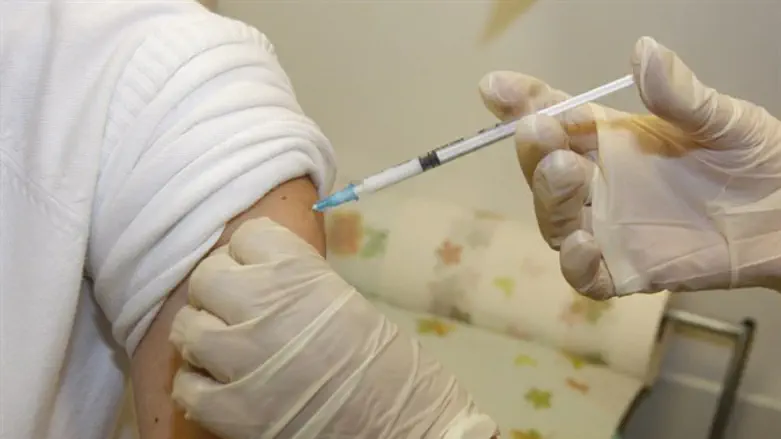
With the onset of winter, the vaccination season also begins. School children are vaccinated and the elderly population is called to go to medical centers to get vaccinated.
In recent years, the issue of vaccines has caused widespread public, medical, and ethical controversy. Next month, a conference will be held in Tel Aviv on the various issues involved.
Arutz Sheva spoke with scientist Dr. Chana Gabay, for whom the issue is not clear and decisive. "A dispute has arisen on the issue of vaccines. Some call unequivocally to vaccinate because that’s what the Department of Health established, and some call to investigate because there is a great deal of information and there are many who have been harmed by vaccines,” Dr. Gabay says. "There is a lot of information on the internet and you need to know what information to rely on."
"It is also possible to turn to experts, and this is one of the reasons why I am launching a digital course on full transparency regarding childhood vaccines. I try to make the material accessible to those who do not have the tools to check online if what they are told is the right thing. Every opinion has its supporters and detractors, but the more that parents get support and scientific resources, the more they are able to choose their own path."
Dr. Gabay's view is that the decision is a personal one. "Every parental couple should discuss this issue. This is not a subject for which you can just rely on what someone has said. Every parental couple has to make an individual decision, and I expect different answers."
"There is a lack of understanding of the science that continues onward to misinterpretations. Anyone who thinks a vaccine is good enough should get the vaccine and be calm, but it does not make sense to get the vaccine and still think that someone will infect you if you are vaccinated," she says, referring to criticism by vaccine advocates against those who prefer not to vaccinate. "Herd immunity is a concept borrowed from natural immunity. They said that if a certain percentage of the population has immunity - about 55 or 68 percent - then the entire population will have immunity. This idea has been transferred to the issue of vaccines and the view that the more people that are vaccinated, the more the population will have immunity."
Gabay notes that the actual reality is that at a given moment, a significant portion of the population is not immunized, in part due to the expiration of vaccine potency. "Childhood illnesses once took place around the ages of 3 to 15, and today the condition of the body has changed and the illnesses can attack before or after those ages. The reason for repeating vaccines is that vaccines don't last over time."
Regarding her encounters with parents and the information she shares with them, Dr. Gabay says: "I give what seems to me essential to understanding the issue at a popular and appropriate level for most parents. I talk about what bacteria and viruses are and what our relationship with them is. As humans, we are made up of cells, but most cells are bacteria cells and our genome is made up of ten percent of viral genome, so in fact we live many years alongside the bacteria and viruses and we can't live without them. They are in our bodies and not something completely foreign to us."
Gabay adds: "We also have to understand that each one has his own bacterial system. It is a type of fingerprint, and therefore everyone will be influenced differently by external factors. Therefore, there are those who will respond to the vaccine better and those who will respond to it less well, just as there are those who will respond to a particular disease better or less well.”
She says vaccination has a price that must be considered when making the decision: "Everything we put in the body causes us some change and shock. A vaccine is supposed to cause us shock, because if it does not cause a shock, the immune system will not act and will not produce antibodies against it. The vaccine causes a change in our natural immune system, and it can also cause additional shocks, even if temporary."
Regarding her own position on the issue, she says that in the past, "As a researcher at the Hebrew University, I didn't think to doubt the subject of vaccines because it was clear to me that the matter was tested and safe, and that there was no problem with it. As long as I was at the research institution, that’s what I thought, and I was angry at anyone who thought differently. When I left and saw things from afar, I started to see things a little differently. Over the years, I vaccinated my kids and even added vaccines that were not then in the regular schedule because I wanted to protect them. From afar, things appear to me differently, especially after I realized that vaccines are not just the biological material but other substances that enter the body, beyond the fact that the mere insertion of the vaccine into the body weakens the natural immune system."
In light of these remarks, Dr. Gabay was asked, as one who holds such a position, whether it was right that specifically she should convey the information to parents who do not always have enough information at their disposal to challenge her positions. Gabay clarifies: "In the course they will receive all the data and can ask questions, and anyone can still reach his own conclusions from the data. I'm not telling anyone what to do, not even my own children regarding my grandchildren. I just want to give as much information as possible."